Planning Overview
This section has general information on planning, what to think about and when to do it.
There are checklists and recommendations to help plan and decide what is best for each individual.
There are also templates to use to manage health and share information to help those you are supporting.
Key Information & Factsheets
Preparing to plan can bring different emotions to everyone. It can be an exciting moment of taking control of the supports in your life through to a daunting experience not knowing where to start and worrying if you’ll miss or forget something. When funding is being sought, the stress and worry can be heightened.
Your funding planner and those who you choose to support you will assist you to consider what your needs are based on your goals.
Ask those that you trust and know you to help you create a list of goals. Many service providers can help you figure out what you actually need to do to reach your goals. They do this by talking to you and completing assessments and reviews.
When it comes to your health and wellbeing and what may happen as you get older, it can be hard to think ahead especially if you are not really sure what it is that you are supposed to be thinking ahead about. Health professionals can provide recommendations to help you plan.
Asking for Help
Many people with physical disabilities state that it is hard to ask for help. If you need help, it is always ok to ask.
Be honest about what you can and can’t do. If you can do something by yourself but it causes you pain or makes you very tired or means you can’t get out and about, it is always ok to ask for help.
If you have support in the home or equipment to help you but it isn’t meeting your needs, it is always ok to ask for help.
Information and websites
The National Disability Insurance Scheme website has some useful information about the planning process. This is a great place to start.
Online: www.ndis.gov.au
Online: futurethinking.abilitycentre.com.au
This list of questions, while not exhaustive, can be useful in helping to identify your health and wellbeing needs. Being healthy and having a well-balanced life is important to enable you to do the things that you want to do – the questions below can assist with forward planning.
My Home
- Is your current living situation working for you? What is your long term plan?
- Do you have funding or savings to use if you are considering a change in your living situation?
- Do you have support in the home to do your daily tasks? Is it enough?
- Do you participate in home tasks? Do you want to do more? Do you want more help for tasks because you can’t do something or you have no energy left for other activities?
- Do you need any equipment to help you around the home?
- Do you manage your own budget? Do you need help? Do you want someone to help you or do it for you?
- Do you need any help with personal care (e.g. showering, dressing, toileting)?
- Do you need any help with cleaning, shopping or cooking?
- Do you need any help with maintaining your home e.g. gardening?
Activities / Recreation / Leisure / Community Participation
- What does a typical day look like?
- Do you receive support to do the things you want to each day? Is it enough?
- Do you have funding for the support to do the things you want to each day? Is it enough?
- Do you have equipment to do the things you do each day? Is it meeting your needs?
- What do you enjoy? Share this with your planner and those who support you.
- Are there activities you want to do but can’t? Would support or therapy or equipment help you do these activities?
Mobility
- How do you move? How do you transfer?
- Do other people help you? Do you use equipment? Can you do what you want to do?
- Do you experience any pain?
- Are your tired? Are you exhausted at the end of the day even when you haven’t done very much?
- Can you move about in chairs or your bed?
- Can you get to places you need to at home and in the community?
- Do you exercise or complete any extra physical activity?
- Have you been reviewed at least yearly by a physiotherapist and an occupational therapist?
Communication
- Do you have trouble telling people your needs and wants?
- Do you use any tools whether they be in paper form or a communication device?
- Do you have trouble understanding others?
- Do you have trouble with reading and writing?
- Have you considered a review with a speech therapist to assist you?
- Have you had any equipment reviewed by a speech therapist?
Mealtimes and Nutrition
- Do you have any trouble with eating or drinking?
- Do you cough when eating or drinking?
- Do you use thickened fluids?
- Do you have modified food textures?
- Do you have a mealtime plan to help you know what you can and can’t swallow?
- Have you been reviewed at least yearly by a speech therapist if you have any swallowing problems?
- Do you have a balanced diet?
- Do you have any weight problems e.g. underweight or overweight?
- Do you have a specialised diet?
- Do you have a PEG or similar?
- Do you have a diet plan?
- Have you been reviewed by a dietitian?
- Do you need any specialised equipment or other supports to use when eating and drinking?
- Have you been reviewed by an occupational therapist?
Sleep
- Do you have trouble sleeping?
- Do you have any pain overnight?
- Are you comfortable in your bed?
- Have you spoken to your GP or specialist about your sleeping?
- Have you been reviewed by an occupational therapist and / or physiotherapist?
Social and Emotion Needs / Mental Health
- Do you have any concerns about how your mental health or social and emotional needs are met each day?
- Do you need support?
- Have you seen a psychologist and / or social worker?
Education / Work
- Do you have support to go to school or uni or TAFE or other educational setting?
- Do you need equipment or more support to do what you want to do?
- Are there any access problems?
- Do you need support from therapists to assist you to do what you want to do?
General Health
- Do you have good health?
- Are your needs being met?
Health and overall life management are important considerations as you get older. If you want to plan who will support or assist you in the event you are not able to or you are someone who is supporting someone with a physical disability who needs support, there are many links and pamphlets provided by the Western Australian Government.
Topics include:
- Enduring Power of Attorney
- Enduring Power of Guardianship
- Planning for the future
- Advance Health Directives
Online: https://www.justice.wa.gov.au/
Talk to your general practitioner (GP) about future health and life planning.
There are many times of transition across the lifespan:
- Starting school
- Moving to high school
- Graduating high school and taking a path into further education, employment or recreation
- Moving out of the family home
- Renting or buying property
- Changing jobs or education
- Settling down and having a family
- Reducing hours of employment
- Retirement
- Finding new activities and travelling in the twilight years
Everyone needs to think about what their needs are when they change what they are doing. There are extra things to think about if you have a physical disability. By being aware, prepared and taking early action will help you to do the activities that you want to do.
Health professionals can help you to know what you need to consider and the best way to prepare and take action.
Transitions related to mobility
Research has identified two major transition periods in the life of an adult with cerebral palsy (CP) related to their mobility: the first occurs at around 20 to 25 years of age; the second generally at around 40 to 45 years of age. Clinically, health professionals note that regardless of ability, people with physical disabilities experience difficulties during these periods.
20 to 25 years
The first age peak is often associated with an increase in a bent knee walking pattern, known as progressive crouch gait. People may find themselves not being able to keep up with their peers within the community, workplace or academic setting.
40 to 45 years
The second age peak of 40 to 45 years coincides with further difficulties to participate, often due to increasing fatigue, pain and faster than normal joint degeneration that can make walking very difficult. The use of wheeled or powered mobility equipment is an option many people may seek at this time.
Awareness and planning well before the two major transition periods is a very important part of maintaining independence and lifestyle. A review by a physiotherapist before these critical times is highly recommended, to:
- Assess mobility
- Put in place preventative strategies to help avoid or reduce changes in movement ability, including strengthening programs, equipment prescription, referrals for investigations, self-management strategies, review of workplace or task specific ergonomics, gait retraining or modifications to movements
- Refer to other allied health and medical professionals for further support.
Transitions related to schooling
Transitions related to schooling can include day care to kindergarten; kindergarten to pre-school; preschool to primary school; primary school to high school; and high school to further study or life after school.
These transitional times are often busy; they generally go hand in hand with increasing independence, increasing time spent away from main carers or family, changes to cognitive and emotional levels and also physical maturation. With all of these things happening, adulthood and planning for years into the future can seem too far in advance to think about, but it is very important that planning for adulthood begins early during the teenage years.
Big grand plans do not need to be made. Rather, thinking about and taking action with regards to health and physical wellbeing is most important. What happens as a teenager has a big impact on what people will be able to do later in life physically.
Research indicates that planning for the future needs to start no later than 14 years of age. In reality it is never too late to start planning, but an early start is best if possible.
Regular consultation and monitoring by health professionals will help to ‘future proof’ the body. During the school years, health professionals can assist with a broad range of areas including:
- Specific exercises to assist with skill development
- School-based programs to assist with accessing curriculum
- Sports-specific skill acquisition for inclusion within school sports such as athletics, swimming or team sports
- Programs for skill attainment
- Recommendations for individual or group therapy sessions for goal-directed therapy
- Home programs
- Facilitating increased participation and access within the community
- Assessment of school environment access for play and recreation
- Assistance with communication and access to the community
- Equipment and other assistive technology to assist participation
- Consultation for orthopaedic surgery to improve body movement
- Advice about medication and treatments for improved body health and movement
- Assisting adolescents with taking control of health, wellbeing and general life in preparation for adulthood
Transition to life after school
The transition from school to life after school, which may include employment, further study, a gap year or moving away from home. Preparation for this transition needs to start in the mid-teenage years.
Increasing independence across all areas is a key feature of the transition from school to life after school. This also coincides with exiting the paediatric health services and negotiating the adult tertiary health system, which may require some increased awareness and planning.
Establishing a relationship with a GP is an important foundation for health management in adulthood for everyone with a physical disability. It is recommended that while people are still receiving support from paediatric services that they commence finding a preferred GP and begin to hand over specific health concerns or relevant health history.
There are no automatic referrals for adult services after an individual has exited paediatric health services. Because of this, a good relationship with a trusted GP is important to facilitate referrals into the adult tertiary health system.
For individuals with specific needs that require continuous monitoring, it is a good idea for a paediatrician to provide handover and recommendations to specialists in the required fields before the individual exits paediatric services. A GP can then refer the individual to the services they require, and the GP and the new specialist will have a full past medical history to base their care on.
There are many programs within the health system that people can access through their GP. Access and participation can be exciting, daunting and challenging all at once – particularly as people start to lead an adult life with increased independence.
It is important to remember that family and support workers can provide support for people with physical disabilities as needed. Being an adult does not mean that a regular support network is unavailable. For some families, encouraging an adult child with physical disabilities to explore their independence can be challenging; for others, figuring out when to ask for help can be difficult. A GP and support team can assist in figuring out levels of help needed, and how best to access that help.
Transition to a new home
There are many things for an individual to consider when leaving the family home or moving house. Some would argue that moving house is one of the most stressful times of life. For people with a physical disability, there are added stresses related to access, equipment and day-to-day support in a new environment.
It is important that whatever decisions are made around moving to a new home, conversations about the transition are started early and there is an understanding that it may take time to put everything in place.
To assist with awareness and planning around the move to a new home, a range of community services and organisations are available.
Consultation with a therapy team is also recommended. During this transition, a team can provide information about support, equipment and assistive technology so that it can be made available when needed.
Transition to retirement
At some point during ageing, retirement and what this may mean will be a consideration. Deciding when to retire often depends on a number of factors including:
- A desire to stop working
- Available income
- Plans for activity after retirement
- Available support
- The body’s ability to continue to work
People from all walks of life retire at different times and for different reasons. For some, retirement is in the 50s while others work well into the 70s and beyond; some choose to retire to pursue plans such as travel, while for others retirement happens because the body is in pain or too fatigued for daily work.
A plan for retirement is important. For people with a disability considering retirement, continued monitoring by health professionals and a plan to remain physically active is recommended.
Transitions related to health
In addition to transitions related to mobility decline, many people with physical disabilities experience a decline in health.
Declines in health often mean that day-to-day activities must be completed in different ways.
For many people with physical disabilities, health transitions are confronting: for young adults, for example, not being able to do the activities they enjoy, having to use equipment or asking people for assistance can be very challenging.
By staying in touch with health professionals in both the hospital and community setting, small problems with health can be managed to prevent long term or bigger issues.
When health transition impact lifestyle, health professionals can assist in establishing ways to enjoy life while maintaining good health; in many cases, this simply means enjoying activities in a new or slightly different way.
Reference
Murphy, K. P. (2010). The adult with cerebral palsy. The Orthopedic Clinics of North America, 41(4), 595–605. https://doi.org/10.1016/j.ocl.2010.06.007
The needs of people with physical disabilities vary depending on age.
Teenagers 12-17 years
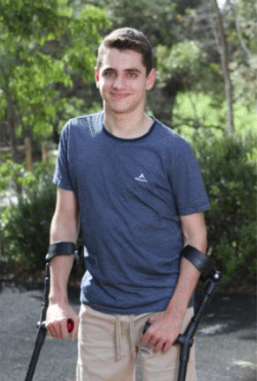 Did you know that what you do as a teenager has an effect on what you can and can’t do when you are older? Don’t worry! You don’t have to know what you’re going to do or plan your life out completely! There are just a few things you need to know and think about to help you as you get older.
Did you know that what you do as a teenager has an effect on what you can and can’t do when you are older? Don’t worry! You don’t have to know what you’re going to do or plan your life out completely! There are just a few things you need to know and think about to help you as you get older.
This is a time of rapid growth and as you reach skeletal maturity, it is important to understand what your body needs before you stop growing. It’s also a time of great change, moving from high school to life after school, parent to independent control and moving from the child to adult health systems all in the space of a few short years. The need to start planning is very important.
It is recommended you...
- Start planning for adulthood no later than 14 years of age.
- Talk to your paediatrician and therapy team about what needs to be done.
- Find a GP and start transferring health information from your paediatrician to your GP each year.
- Get to know what your diagnosis means for you.
- See your physiotherapist for a full review every year.
- See your occupational therapist and speech pathologist every year for reviews and recommendations.
- Ask who else in the health team you need to see.
- Ask: if surgery is required, is there a time limit? Many surgeries need to happen before you stop growing.
- Before you exit child health services, ask and have a plan: What do I need as an adult? What is available to help me? What referrals do I need?
- If you have any worries or concerns, see your social worker and / or psychologist.
- Start thinking about life after school. Tell your family, planner and health team so they can help you.
Young Adults 18-25 years
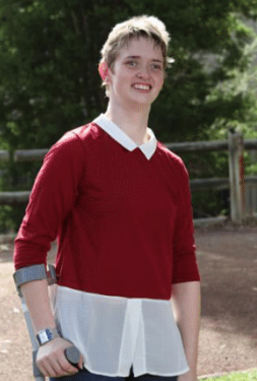 A time of exploring the new adult world, increasing independence in life and health care and for some a time when abilities like walking start decreasing due to decreased strength and increased weight. Young adults often break free of therapy and health appointments, however the need to keep seeing health professionals for timely support is very important.
A time of exploring the new adult world, increasing independence in life and health care and for some a time when abilities like walking start decreasing due to decreased strength and increased weight. Young adults often break free of therapy and health appointments, however the need to keep seeing health professionals for timely support is very important.
It is recommended you...
- Continue planning for the supports you need as an adult. What do you need for your health? What do you need in the home, community and for work and recreation?
- Finalise your transfer from child health services to your GP and any adult health services you need.
- Continue to get to know what your diagnosis means for you and what you need to do as you get older.
- See your GP and physiotherapist for monitoring every year regardless of your abilities.
- Keep your weight in a healthy range, see a dietitian for advice.
- See all health professionals that you need as often as recommended. Ask for an assessment if you do not know who to see or how often you should see them.
- If you have any pain or tiredness, seek help, don’t ignore it.
- If you have any worries or concerns, see your social worker and / or psychologist.
Adults 26-40 years
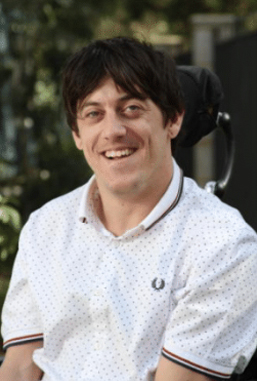 A time when people are concentrating on their life activities and perhaps not so much on their bodies. The general wear and tear of life on the body starts to take effect and people start feeling they are very tired and sore. A time of exploring what you need to do to maintain your abilities while not being too tired or in pain. The need to find balance in all parts of your life and seeing health professionals for timely support is very important.
A time when people are concentrating on their life activities and perhaps not so much on their bodies. The general wear and tear of life on the body starts to take effect and people start feeling they are very tired and sore. A time of exploring what you need to do to maintain your abilities while not being too tired or in pain. The need to find balance in all parts of your life and seeing health professionals for timely support is very important.
It is recommended you...
- As your needs change, keep planning for the supports you need as an adult. What do you need for your health? What do you need in the home, community and for work and recreation?
- Discuss with your GP what your health needs are now and whether there is anything specific you need to pay attention to.
- Discuss with your health professional team what your goals are and ask what you need to do to stay healthy, active and pain free.
- See your GP and physiotherapist for monitoring every year regardless of your abilities.
- See a speech pathologist for a swallow review from 30 years of age. Ask if you have any risk factors and how often you should have a review.
- See an occupational therapist every year to review how you do your daily activities and all your equipment and assistive technology needs.
- See a dietitian for advice on keeping your weight in a healthy range.
- See all health professionals that you need as often as recommended. Ask for an assessment if you do not know who to see or how often you should see them.
- If you have any pain or tiredness, seek help, don’t ignore it.
- If you have any worries or concerns, see your social worker and / or psychologist.
Adults 40+
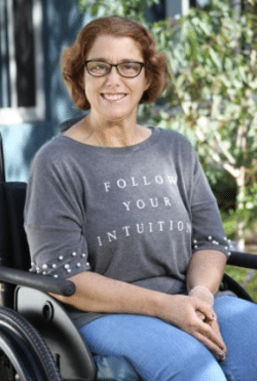 A time when finding balance is most important. Preventing tiredness, pain, a sense of burn out and having to stop doing what you love needs to be thought about. Home and community services and health professionals can help you find the balance you need.
A time when finding balance is most important. Preventing tiredness, pain, a sense of burn out and having to stop doing what you love needs to be thought about. Home and community services and health professionals can help you find the balance you need.
Adults with physical disabilities who are over 40 years of age have common experiences and needs. It has been found that people with physical disabilities are experiencing the ageing process up to 20 years earlier than their peers. This means that you may start feeling the ageing process in your 40s, instead of your 60s. Many people find this confronting and quite frustrating while reassuring that they are not alone in what they are feeling.
There are many factors that determine how our body’s age as we get older. Seeking help as early as possible can slow progression and help you do the things you want to do as you get older.
It is recommended you...
- Keep planning for the supports you need as an adult for whatever stage of life you are at. What do you need for your health? What do you need in the home, community and for work and recreation?
- Discuss with your GP what your health needs are now and whether there is anything specific you need to pay attention.
- Discuss with your health professional team what your goals are and ask what you need to do to stay healthy, active and pain free.
- See your GP and physiotherapist for monitoring every year regardless of your abilities.
- See a speech pathologist for a swallow review at least every one to two years. Ask if you have any risk factors and how often you should have a review.
- See an occupational therapist every year to review how you do your daily activities and all your equipment and assistive technology needs.
- See a dietitian for advice on keeping your weight in a healthy range.
- See all health professionals that you need as often as recommended. Ask for an assessment if you do not know who to see or how often you should see them.
- If you have any pain or tiredness, seek help, don’t ignore it.
- If you have any worries or concerns, see your social worker and / or psychologist.
Please note that these recommendations are a guide only and should not replace a thorough assessment completed by health professionals.
People with common abilities for walking, transfers and sitting have similar experiences and needs.
Understanding the common needs based on how you move around each day can assist you to plan what supports you need.
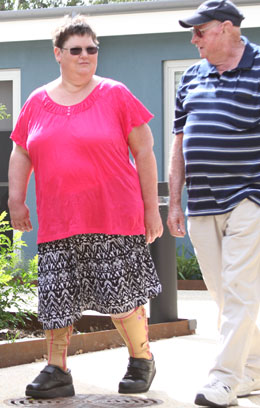 Independent walking
Independent walking
- I can walk and transfer independently
- I can take stairs with or without using hand rails
Actions recommended…
- Consult a physiotherapist yearly for review of abilities and recommendations to maintain independence
- Consult an occupational therapist yearly for review of abilities and recommendations to maintain independence
- Seek help for pain and tiredness – this should never be ignored
- Develop a good relationship with a GP who can maintain a full medical history on file
- If you have any swallowing or communication concerns, consult a speech pathologist for recommendations regularly
- If you have difficulties maintaining a healthy body weight, consult a dietitian for recommendations
- For any wellbeing concerns, consult a social worker and / psychologist
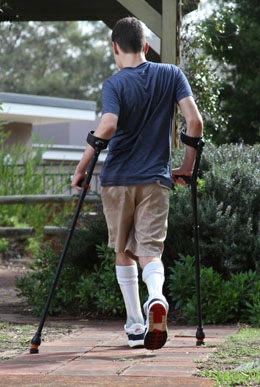 Supported Walking
Supported Walking
- I can walk using crutches or a walker e.g. four-wheeled walker
- I need to use furniture or equipment to stand and transfer
- I need to take lots of rests when walking long distances or park very close to where I am going
- I may use wheeled mobility like a wheelchair or scooter
Actions recommended…
- Consult a physiotherapist yearly for review of abilities and recommendations to maintain independence
- Consult an occupational therapist yearly for review of abilities and recommendations to maintain independence
- Develop a good relationship with a GP who can maintain a full medical history on file
- Seek help for pain and tiredness – this should never be ignored
- Seek support in establishing ways to move around the home and over short and long distances to maintain energy for other activities
- Seek support in establishing balance in work and home life to maintain energy for other activities
- If you have any swallowing or communication concerns, consult a speech pathologist for recommendation regularly
- If you have difficulties maintaining a healthy body weight, consult a dietitian for recommendations
- For any wellbeing concerns, consult a social worker and / psychologist
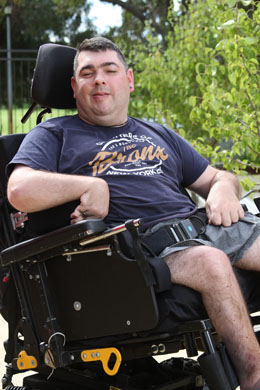 Wheeled Mobility
Wheeled Mobility
- I use wheeled mobility most of the time e.g. a wheelchair
- I may transfer by:
- Stand up holding a rail or furniture or
- Using a standing hoist or
- Using a non weight bearing hoist
- I may need help for most, if not all, tasks in my life
Actions recommended…
- Consult a physiotherapist yearly for review of abilities and recommendations to maintain independence
- Consult an occupational therapist yearly for review of abilities and recommendations to maintain independence
- Develop a good relationship with a GP who can maintain a full medical history on file
- Consult a speech pathologist for a yearly swallowing review, especially from 30 years of age
- If you have any communication concerns, consult a speech pathologist for recommendations
- Seek help for pain and tiredness – this should never be ignored
- Request supports and plans for all aspects of life including: seating, alternative seating, night time positioning, day resting positioning, standing, exercise and physical activity, participating in daily tasks, like cooking and washing, and getting out and about for work and recreation
- If you have difficulties maintaining a healthy body weight, consult a dietitian for recommendations
- For any wellbeing concerns, consult a social worker and / psychologist
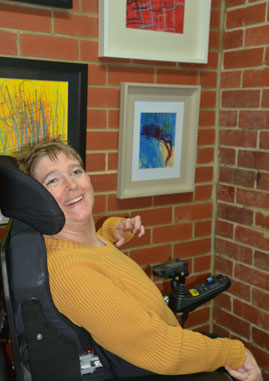 Wheeled Mobility with Additional Support
Wheeled Mobility with Additional Support
- I need support for most, if not all, tasks in life – may or may not include cognitive support
- I use wheeled mobility all of the time e.g. a wheelchair
- I transfer only using a non weight bearing hoist
- I need assistance to control my head
Action recommended…
- Consult a GP regularly for full health support
- Consult a physiotherapist year for review of abilities and recommendations
- Consult a speech pathologist for regular swallowing review, especially from 30 years of age
- Consult an occupational therapist yearly for review of abilities and recommendations
- Consult a speech pathologist for communication strategies
- Request supports and plans for all aspects of life including: seating, alternative seating, night time positioning, day resting positioning, standing, exercise and physical activity, participating in daily tasks, like cooking and washing, and getting out and about for work and recreation
- If you have difficulties maintaining a healthy body weight, consult a dietitian for recommendations
- For any wellbeing concerns, consult a social worker and / psychologist
People with physical disabilities and those in their network often comment that they wish they had known, did not realise what was going to happen as they got older and as a result wanted information on where to start when planning. Often people report that they did not realise something was an issue or could receive support for an issue until it is raised by someone else.
The checklists provide a starting point when you are planning. Answer each question in the checklists relevant to you to find out what is recommended.
The family and support staff checklists are useful for those supporting people with physical disabilities on a daily basis.
The templates are useful to develop a file about you to share information with those who support you. They can be particularly useful if you need to see health professionals in the hospital system and to keep track of your overall health.
